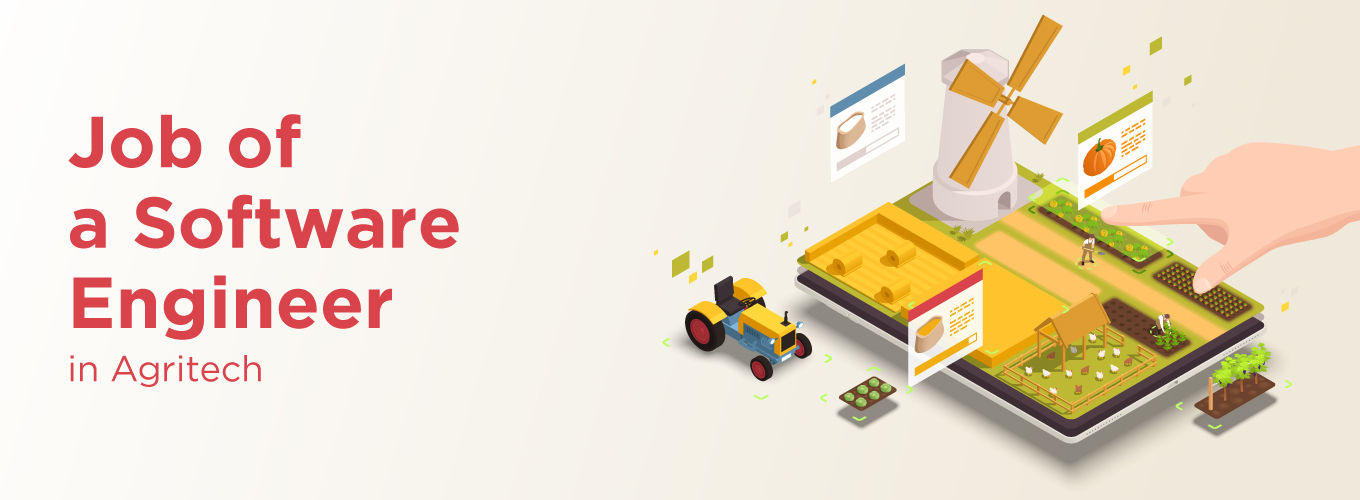Agritech engineering focuses on enhancing farming processes and technologies with an emphasis on sustainability and eco-friendliness. By leveraging technology, agritech aims to improve agricultural productivity while minimizing environmental impact. A software engineer in agritech plays a pivotal role in developing innovative solutions that streamline farming operations, boost efficiency, and drive sustainability.
These professionals possess strong analytical skills and use their expertise to produce products and services that meaningfully impact global food systems. In this article, we will explore the role of software engineers in agritech and the exciting opportunities within this growing field.
What does a software engineer in agritech do?
A software engineer in agritech does much more than just coding. Beyond writing code, they are responsible for defining system requirements and designing its architecture, such as organizing data and structuring pages. They also monitor the performance of their code to ensure it functions as intended. Additionally, software engineers participate in product development meetings, where they discuss new features and improvements.

The role is highly collaborative, requiring extensive planning, teamwork, and communication. They design, develop, modify, and maintain software systems using scientific research and mathematical models to predict and measure outcomes. Software engineers also handle software testing, validation, programming, and documentation.
Furthermore, they may oversee teams of programmers, technologists, technicians, and other engineering and scientific staff, ensuring smooth project execution.
Steps to become a software engineer in agritech
Here are the essential steps to kickstart your career as a software engineer in agritech, including education, skill development, internships, and mentorship, to help you thrive in this dynamic and impactful field.
1. Education
While employers value work experience and technical skills, a strong academic background is essential for a software engineer. Typically, a four-year degree in agricultural engineering, software engineering, or a related field is ideal. Alternatively, acquiring the relevant skill set can also pave the way.
2. Develop Skills
Key skills for a software engineer include strong research capabilities, effective communication, problem-solving, multitasking, and the ability to meet deadlines. It’s also important to engage with customers and manage their experiences. Proficiency in programming languages like Python, Ruby, JavaScript, C#, Java, or C++, as well as expertise in troubleshooting and debugging, are critical for success in the field.

3. Pursue an Internship
Internships provide valuable hands-on experience and are especially beneficial for agricultural engineering students who need field exposure. They offer practical insights and help bridge the gap between academic learning and real-world applications.
4. Seek Entry-Level Positions
Entry-level roles allow you to work closely with senior engineers and gain exposure to the latest technologies. This hands-on experience enables you to improve your programming skills and work on a variety of applications, setting a solid foundation for your career.

5. Find a Mentor
Connecting with industry professionals can greatly accelerate your growth. Mentors offer career guidance, feedback on projects, and interview preparation. They can provide valuable insights into the recruitment process, help you expand your network, and share opportunities that may not be widely advertised.
4 Types of Expertise for Agritech Software Development
Agritech software development requires a combination of advanced technologies to optimize farming practices. From IoT-enabled solutions to AI and machine learning, these expertise areas drive innovation and sustainability in the agricultural sector.
1. IoT-Enabled Solutions
proficiency in IoT and embedded software development is crucial for creating agritech solutions such as crop scouting, NDVI analysis, and livestock monitoring. With IoT technology, farmers can track weather, soil conditions, air quality, and crop maturity, enabling them to take timely action. Some key IoT use cases in agritech include precision farming and livestock management systems, helping farmers optimize resources and improve productivity.
2. Big Data
Big data engineering is becoming an essential component of agritech software development. With the ability to process and analyze large datasets from various sources, big data enables farmers to make data-driven decisions. In agritech, big data is used for precision farming, food tracking, and optimizing supply chains, offering valuable insights to enhance crop yield, reduce waste, and manage resources more effectively.

3. AI and Machine Learning
Artificial Intelligence and machine learning are transforming agritech by automating tasks and improving decision-making. These technologies, combined with big data, allow for predictive analytics, crop and soil monitoring, and the development of agricultural robots for tasks like harvesting. With machine learning models, farmers can predict weather patterns, detect pest infestations, and optimize farming practices, leading to higher productivity and sustainable growth.
4. Business Intelligence (BI)
Business Intelligence (BI) tools empower agritech companies to make informed, data-driven decisions. By aggregating and analyzing data, BI solutions provide insights into crop yields, supply chain efficiencies, and operational performance. BI platforms help farmers plan more effectively, identify risks, and improve productivity through accurate reporting, forecasting, and trend analysis. Integrating BI into agritech systems ensures better decision-making and streamlined operations.
End Note
In conclusion, the role of a software engineer in agritech extends far beyond coding—it involves creating innovative technological solutions that drive efficiency, sustainability, and productivity in agriculture. By leveraging IoT, big data, AI, and business intelligence, software engineers help optimize farming practices, enhance decision-making, and contribute to the future of food security.
As agritech continues to evolve, professionals in this field will play a vital role in shaping sustainable farming practices, ensuring a more efficient and eco-friendly future for global agriculture.


